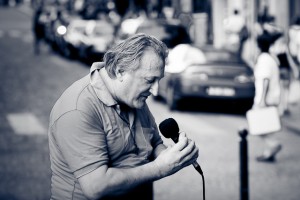
Have you ever watched “The Voice” on television? I’ll confess it’s one of my guilty pleasures, but it’s also an interesting look at our society’s values.
Yes, we love competition, celebrities and big-budget production numbers, with pyrotechnics if possible.
But the real appeal is watching the hopeful contestants sing their hearts out.
We’re looking for authenticity. And I believe our longing for it extends far beyond a musical reality show.
A PENDULUM SWING
I’ve been noticing this phenomenon for a few years, ever since I heard ad man Roy Williams at the Wizard Academy say the pendulum has swung away from shiny veneers and over to authenticity. Vulnerability sells, he said.
That’s not always the case. But right now in our culture, soulful is better than slick, vulnerable is better than cocky, emotion is more important than technique. I see it everywhere, not just in advertisements.
The coaches on “The Voice” tell singers to feel their songs and connect with the audience. Those who can’t do it are cut early. Those who fake it with dramatic pantomimes of emotion are cut, too.
Authenticity is hard to define, but we know what it is not. We also know authenticity when we see it.
That’s why an overweight guy with a guitar and a foot-long beard is currently one of the semi-finalists on “The Voice.” Maybe it explains why a neo-hippie who sang off-key mysteriously made it as far as the Top 11.
Those who remain don’t have to be technically perfect if their music communicates heart to heart, gut to gut.
We’re longing for connection. We love seeing real people shine through the music with their eccentricities and flaws on display.
I would venture to say we love seeing real people shine through any undertaking – their work, parenting, presentations and hobbies.
As Oprah says, nobody can beat you at being you.
WHERE CAN YOU BE REAL?
So what makes you authentic? When are you truly yourself?
Can you bring your full self to work? Can you express who you are at a holiday dining table with family?
And what if the “real” you isn’t always pleasant? Is it ever appropriate to let loose with anger in the name of authenticity? Should “keeping it real” override manners?
I suspect it’s more likely the “real” you is loving and compassionate, maybe more than you let on.
You have to be vulnerable to let someone know you love them. Authenticity is saying the sweet things you think about someone, not just the brutally honest ones.
The dictionary is no help in defining authenticity. “True to one’s own personality, spirit or character.”
Yes, but what does it look like? How does authenticity show up?
FINDING CONNECTION
I believe we recognize authenticity by what we see in the successful singers — connection. Sharing a vulnerable moment in the human experience.
And if authenticity is expressed through connection, then that poses another set of questions.
When do you feel most connected to someone else? Is it when you’re talking, doing things together or sharing silence? Is it when there is some expression of love, in words or deeds?
Or put another way, when do you feel fake? When do you suspect it’s not safe to be yourself? And how could you change or avoid those situations?
Authenticity is personal. I can’t tell you what it is or how to express it. I can’t tell you what it is for you.
But that’s the point! You are unique. There’s never been another you on the planet and never will be.
So I’d love to hear, just because I’m curious and want to support your authenticity . . . When do you feel you are truly being yourself?














